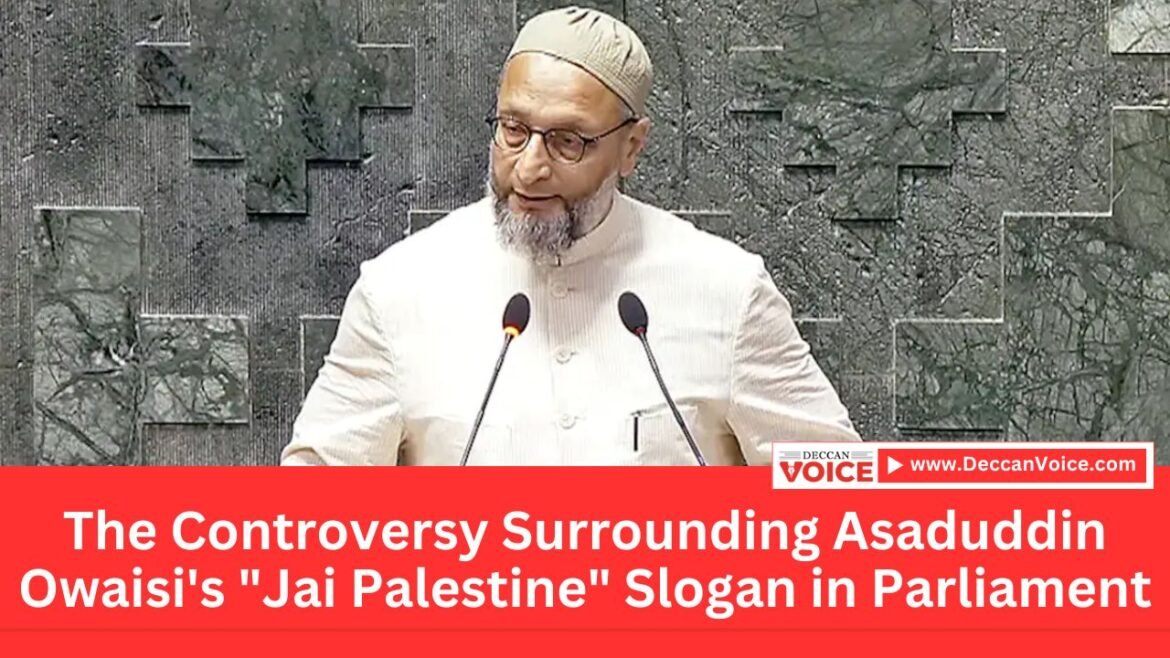Table of Contents
In a recent parliamentary session, Asaduddin Owaisi, the president of the All India Majlis-e-Ittehadul Muslimeen (AIMIM), stirred controversy by chanting “Jai Palestine” as a show of solidarity with the Palestinian cause. This incident has sparked a heated debate across political and media circles, raising questions about media bias, selective outrage, and the role of the press in a democratic society.
The Incident: “Jai Palestine”
During a parliamentary discussion, Asaduddin Owaisi’s chant of “Jai Palestine” was intended to express support for the Palestinian people amid ongoing conflicts in the Middle East. This act of solidarity aligns with his known stance on international issues affecting Muslim communities. However, the slogan quickly became a focal point for criticism, with several media outlets and political figures denouncing it as inappropriate for a parliamentary setting.
Double Standards in Media Reactions
Hindu Rashtra Slogans
A notable point of contention is the perceived double standard in media reactions to similar expressions of ideological solidarity. There have been numerous instances where Hindu ministers and political leaders have publicly declared slogans such as “Jai Hindu Rashtra,” advocating for India to be recognized as a Hindu nation. Despite India being constitutionally a secular republic, such declarations have not elicited comparable media backlash. This discrepancy highlights a bias in how different expressions of ideological solidarity are treated.
Media Targeting of Opposition
The intense scrutiny and criticism directed at Owaisi’s statement reflect a broader pattern in Indian media. Increasingly, media outlets appear to target opposition figures over relatively minor issues while failing to hold the government accountable for more significant policy and governance matters. This selective outrage is problematic for several reasons:
- Distracting from Important Issues: By focusing on statements like “Jai Palestine,” media attention is diverted from pressing issues that affect the general populace, such as economic policies, educational reforms (e.g., NEET), healthcare, and social justice.
- Undermining Democratic Debate: A vibrant democracy relies on a free press that challenges the government and scrutinizes its actions. When media outlets shy away from holding the government accountable, they fail in their duty to inform and engage the public on critical issues.
- Promoting Polarization: Targeting opposition figures for their statements while ignoring similar rhetoric from government allies fosters a polarized and divisive political climate. This approach can exacerbate communal tensions and undermine national unity.
The Role of the Media in Democracy
In a democratic society, the media’s primary role is to act as a watchdog, ensuring that those in power are held accountable for their actions and policies. This includes:
- Questioning Government Policies: Media should critically examine government policies and their impact on the populace. For instance, the implementation and effects of the NEET exam on students’ futures and educational equity deserve thorough scrutiny and debate.
- Providing Balanced Coverage: Coverage should be balanced, providing a platform for diverse viewpoints and ensuring that all political figures are held to the same standards. This helps maintain public trust and ensures that no group is unfairly targeted or favored.
- Focusing on Substantive Issues: Instead of sensationalizing minor controversies, media should focus on substantive issues that affect the nation’s welfare and development. This includes economic performance, healthcare systems, social justice, and international relations.
Conclusion
The controversy surrounding Asaduddin Owaisi’s “Jai Palestine” slogan in parliament exposes significant issues in the current state of Indian media. The selective outrage and disproportionate targeting of opposition figures reflect a deviation from the media’s essential role in a democracy. For the health of India’s democratic process, it is crucial that media outlets return to their fundamental responsibilities: questioning government policies, providing balanced coverage, and focusing on issues of national importance. Only then can the media contribute to an informed, engaged, and united citizenry.



